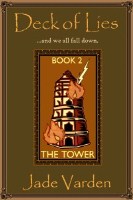Let's face it: ereaders are awesome. They're lightweight, they're easy to hold, they can store thousands of books...they totally look like those electronic pads the characters on Star Trek walked around with all the time. I'm practically having a relationship with my Kindle. But if there's anything about reading ebooks that's not-so-awesome, it's the navigation. You can fix all that, and make the best parts of your book more accessible, by including a table of contents.
The TOC in the Modern Age
Many authors and readers consider the Table of Contents to be a bit of a wasted page in print books. Why tell me the names and location of every chapter, if I'm obviously going to find them while I'm reading anyway? But in the world of ebooks, the TOC is anything but a waste. For navigation's sake alone, you need to include it.
In ebooks, each entry in the TOC also acts as a link. Readers can very quickly and easily access a specific chapter anytime they wish...and don't you want them to keep coming back to your book, again and again? If they have to sit and page through tons of text, they're going to get frustrated and give up. Electronic things are supposed to make life easy.
Adding a Table of Contents also gives ebooks another invaluable feature: a bulleted read meter. Open an ebook, go to a random page, and look to the bottom of your ereader. See the line telling you how many pages or what percentage of the book you've gone through? When a TOC is in place, little tick marks will appear that show a reader when they're approaching a new chapter. It's a nice little feature, one that makes things easier and helps to naturally separate your text.
And if you still aren't convinced that you need a TOC for your ebook, then let this sway you: it's really easy to add one.
How to Add a TOC
Adding a Table of Contents is no big deal, but it makes a big difference. There are approximately two ways you can go about it.
- HTML
Yes, it's almost always the answer to any ebook problem. Want to add something to your ebook? There's a code for that. And when it comes to adding a TOC, it's this:
<div id="toc"> <p>Table of Contents</p>
<p><a href="#chapt1">Chapter One</a></p>
<p>a href="#chapt2">Chapter Two</a></p>
and so on.
Within the text of the book, you should place these tags around each chapter to link them to your TOC:
<mpb:pagebreak />
<h1><a name="chapt1">Chapter One</a></h1>
If you're using chapter titles or some system of your own, substitute "Chapter One" and all the rest with whatever you've used for your chapters.
Frankly, it can be a pretty drawn-out affair, and if you get a single character wrong when you're writing out your HTML the Table of Contents won't work correctly. This is why I use my ebook conversion software, MobiPocket, instead. Load up your file, and simply hit the "Table of Contents" button to create it much more easily.
- The Easy Way
Luckily, there's an even easier way to create a TOC for your book: use Smashwords. There is no easier way to convert a .doc file into an ebook than this system, and if there is I haven't found it yet (but I'm open to suggestions). You cannot make use of this system if you're going to enroll your book in the KDP program. But if you aren't going the Amazon KDP route, Smashwords is absolutely the easiest way to go about doing this. Simply submit your .doc file to the system, go through the automatic conversion process, and download the Kindle-friendly copy of your own book free. You can get it in .mobi, .epub, .pdf and other formats. Here's the important part: Smashwords automatically generates a Table of Contents.



















